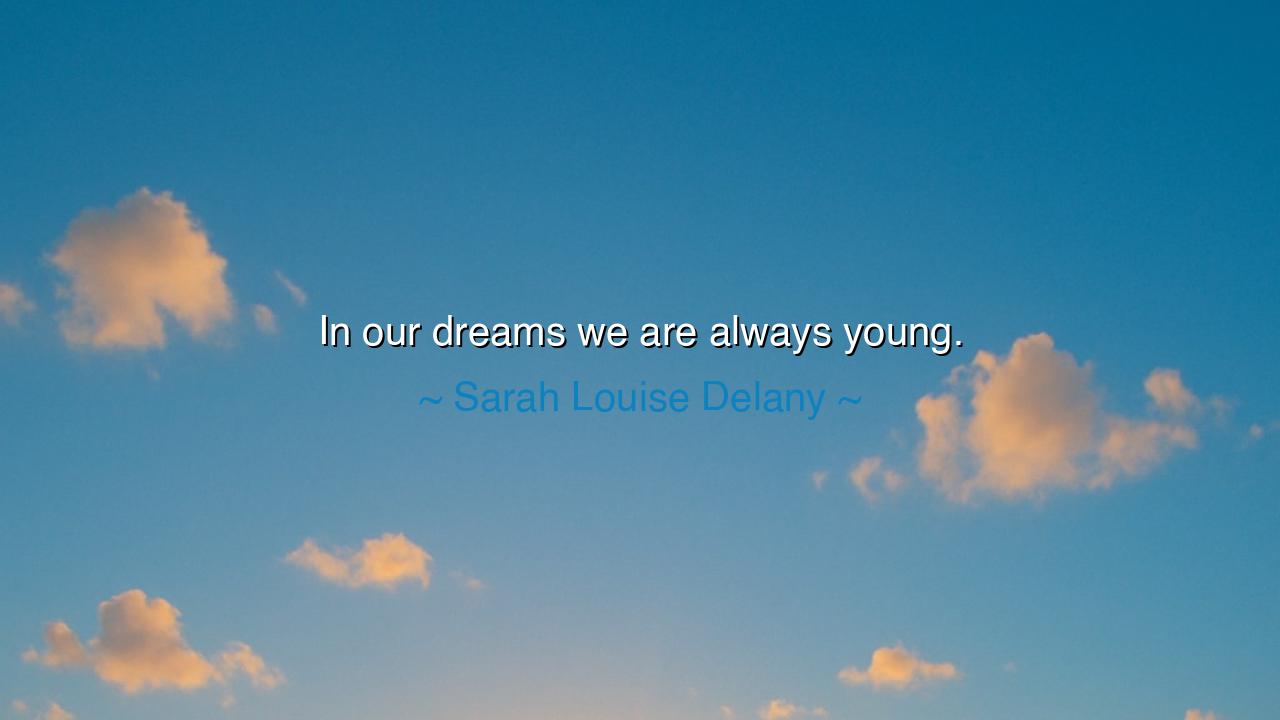
In our dreams we are always young.






In the evocative words of Sarah Louise Delany, "In our dreams we are always young," we are invited to reflect on the timeless and boundless nature of our inner spirit. Dreams, in their purest form, are not bound by the physical limitations of the body or the constraints of time. Delany’s statement speaks to a universal truth that resonates deeply with the human experience—youth is not just a matter of age, but of the soul, the heart, and the mind. In dreams, we are free from the aches and burdens of aging, and we are forever alive in the vibrancy of our youth. It is in the realm of dreams that we remain unshackled by the passing of time, ever capable of aspiring, growing, and seeking what we once thought impossible.
In the teachings of the ancients, the idea of youth was often intertwined with the pursuit of wisdom and the energy of possibility. The Greek philosopher Socrates spoke often of the importance of maintaining a youthful spirit, one that was always curious and eager to learn, no matter the passage of years. Socrates believed that to be wise was to never lose the desire to know, to remain ever open to new ideas, and to continually challenge one’s understanding of the world. In this sense, youth was not just a phase of life, but an approach to life itself—one characterized by wonder, questions, and a boundless quest for truth. Delany’s reflection aligns with this ancient understanding, suggesting that in our dreams, we tap into the eternal youth of the soul, constantly in the process of learning, growing, and exploring.
Consider the life of Leonardo da Vinci, who, even in his later years, remained vibrant in his intellectual pursuits. His dreams were not limited by the fact that his body aged; rather, he continued to innovate and create with the same passion and curiosity as when he was young. Da Vinci’s notebooks are filled with inventions, scientific observations, and artistic designs that show no sign of the limitations often associated with aging. Like the youth of the soul that Delany describes, da Vinci’s intellectual youth never faded, for he remained always driven by the same thirst for knowledge and discovery. In his dreams, as in the dreams of all great thinkers, he was perpetually young, ever capable of new ideas, no matter his age.
Similarly, Maya Angelou, the great poet and activist, exemplified how the spirit of youth remains ever-present, even in the later years of life. Angelou's work, particularly in her later years, carried a vibrancy and hope that inspired generations. Despite facing challenges and the weight of time, Angelou's words resonated with the youthful energy of someone who had never stopped dreaming. In her dreams, she continued to build, to fight, and to inspire with a clarity and passion that transcended the physical limitations of age. Angelou understood deeply that to keep the dreams alive was to maintain the youthful spirit, to believe that there was always something new to be discovered, no matter how many years passed.
In dreams, we are free from the limitations of the physical world—our bodies age, our abilities change, but in the world of dreams, time is irrelevant. This timeless youth is not merely about physical appearance or strength, but about vitality—the ability to constantly grow, to reach for something new, to continue in the pursuit of purpose and passion. The ancients often spoke of the importance of maintaining a youthful heart—the heart of a warrior like Hercules, who, though faced with immense trials, never lost his spirit of adventure and courage. In this context, dreams are not simply products of sleep, but the reflections of the soul's eternal youth, forever unburdened by the physical ravages of time.
The lesson we learn from Delany’s words is that youth is not a fleeting phase but a state of mind, a vision of endless possibilities. As we face the passage of time, we must remember that our dreams hold the key to eternal youth. Our bodies may grow weary, but our dreams and our aspirations can remain ever vibrant, ever fresh. The youth of the soul is not found in the number of years lived, but in the willingness to continue dreaming, to continue growing, and to continue believing in a future that is full of possibility.
In our own lives, we should embrace the spirit of youth that resides in our dreams, nurturing it with hope and passion. Whether we are young or old, we must keep alive the belief that there is always something new to learn, something to create, and something to explore. Just as Socrates and Angelou kept their intellectual youth alive throughout their lives, so too must we strive to remain curious, to remain open to the future, and to hold fast to our dreams. In doing so, we ensure that our youthful spirit never fades, that we are always alive with the energy and vibrancy of the dreams we hold, forever unbound by the passage of time.






AAdministratorAdministrator
Welcome, honored guests. Please leave a comment, we will respond soon